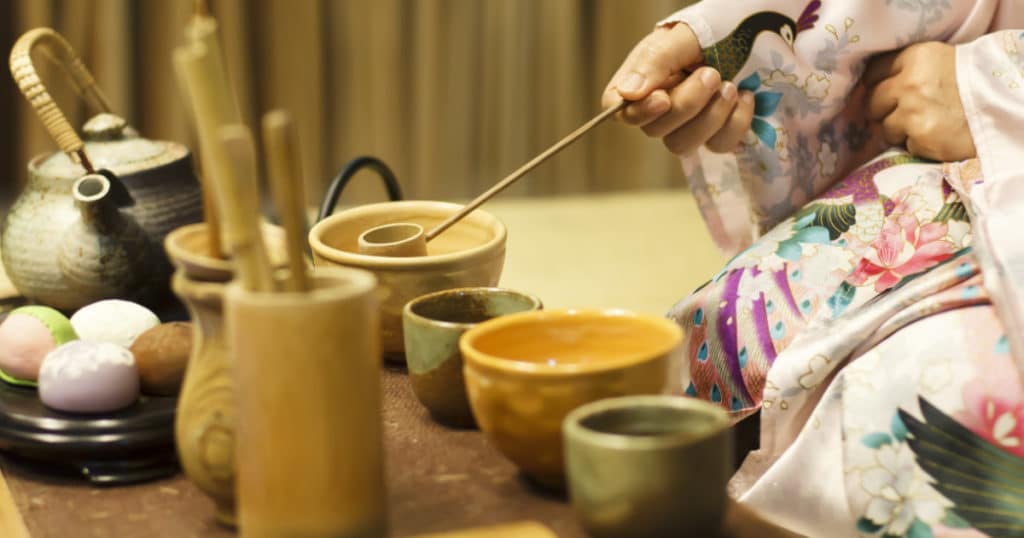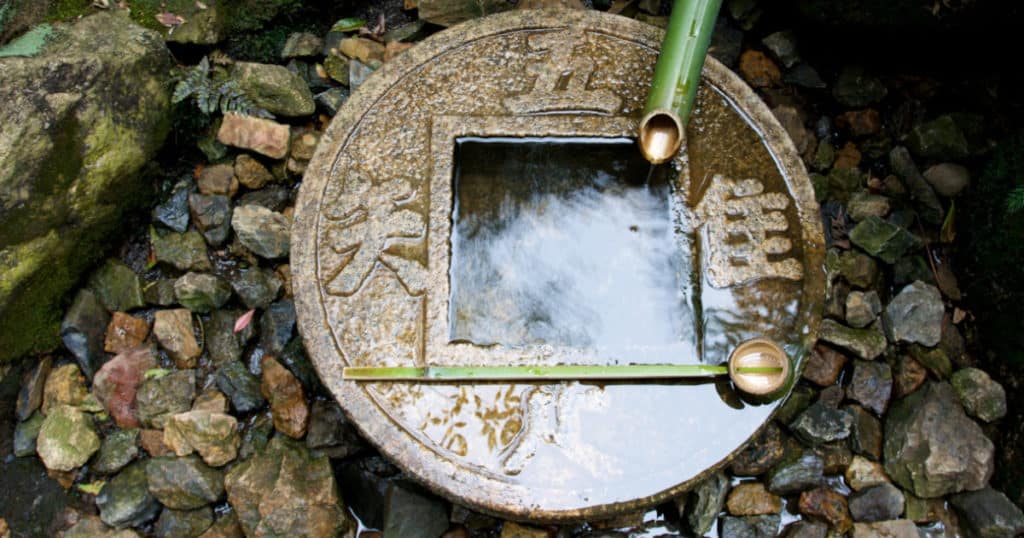Japanese culture is both modern and traditional, steeped in centuries of heritage and yet dynamic and rapidly developing. This duality makes sense given some of the values and beliefs that define the country. The language is full of untranslatable words and concepts that describe ways of looking at and existing in the world that are fundamentally, uniquely Japanese.

How to Exist in the World
The Japanese way of existing in and relating to the world has much to do with harmony, restraint, and balance. Relationships are understood to be interdependent, hierarchy and social obligations are taken seriously, and high value is placed on reputation and honour.
There is much to be learned from the following five Japanese words that describe ways of existing in the world, all of which seek to foster the reciprocal community and social harmony that are all part of a long, fulfilling, and successful life.
Honne-Tatemae
The duality inherent to honne and tatemae is sometimes thought of as paramount to Japanese culture, the guiding lines of how to relate to the rest of the world. Honne refers to a person’s true feelings, our authentic thoughts and inner desires. The word translates to something like “true sound” and can be thought of as the “true voice of our hearts.” Tatemae is the inverse of honne, and describes our public behavior, the façade we all adopt in line with social or professional expectations.
Honne and tatemae are inherently separate, and there is no need for tatemae to align with honne. In fact, it is expected that one’s true thoughts remain hidden, or shared only with close friends and confidants, in order to behave according to the circumstances defining the outer world. Rather than being “fake” or insincere, honne-tatemae simply acknowledges a truth that every culture understands to some degree. We all censor ourselves around strangers, supervisors, and even friends to avoid offending people or hurting feelings. In Japan, the honne-tatemae divide avoids unnecessary hurt and conflict while prioritising harmony, understanding that some beautiful things are even more precious when hidden.
Nemawashi
Nemawashi is a gardening principle used for business. It means “preparing or digging around the roots” and refers to the delicate process of readying a tree for transplant. The roots are carefully unburied and soil is added from the new location to allow the tree time to adjust to the conditions of its destination. Without this process, the plant may die in new soil. Nemawashi refers to the understanding that people, too, need time adjust to change.
Nemawashi describes the round of pre-meetings that are held before a formal meeting, allowing participants time to adjust to new information, draw their own conclusions, and ready themselves for an announcement or decision. At face value, the idea can seem time consuming – what do you mean pre-meetings? – but in reality nemawashi saves time. It allows for the truth that people, like plants, need time to adapt to new opinions and beliefs, and provides that opportunity well before the big meeting. This way, no time is wasted in arguing, explaining, or convincing, and can instead be used for constructive forward motion.

Ikigai
The closest approximation to the all-encompassing word ikigai is the French concept of raison d’être, or “reason for existence.” This groundbreaking Japanese philosophy has its origins in the island of Okinawa, one of the world’s five “blue zones” where people live much longer than everyone else. Okinawans cite ikigai as one of the central reasons for their longevity.
To have ikigai is to have a purpose, to live a life where one’s passions, talents, and skills align with harmonious interpersonal relationships and a way to serve the needs of the world. It is often mis-translated as a way to find a “dream job” or “fulfilling profession”, but ikigai is much more than a career path or passionate way to get paid. It’s about a way of existing and making choices with devotion and enjoyment, and an inner state of satisfaction with one’s place in the world.
Moai
Moai means “meeting for a common purpose” and refers to the social support groups that are a central pillar of ikigai. Moais began as a means of public funding, where villagers pooled their resources for community development projects. Now, there is an element of loving companionship and spiritual encouragement inherent to the word, a group of neighbors that one meets with for everything from financial assistance to gossip and life advice.
The word goes deeper than mere friendship and involves connotations of devotion and interdependency. The phrase “tell me who your friends are and I’ll tell you who you are” gets towards the heart of it. No man is an island, as they say, and an individual is only as strong as the links within their community. Citing moais as another explanation for their longevity, Okinawan people explain that having an essential network of committed social support can – and does – add years to a person’s life.
Ichi-Go-Ichi-E
This idiom can be translated to “one time, one meeting” and refers to a once-in-a-lifetime encounter, but with the caveat that everything is a once-in-a-lifetime encounter. The word encourages us to “be here now”, to be present in our lives and treasure every moment knowing it will never happen again. The phrase has its roots in tea ceremonies, which participants knew would never be recreated exactly the same way again, and so each sip and moment of conversation should be approached with reverence and respect.
Even things we do experience every day – the sunrise, a cup of coffee, our families and partners – not only exist ephemerally but also are never actually exactly the same each time they are beheld. No moment, no encounter, no circumstance at the intersection of time and space is repeatable. The singularity and impermanence of all of these synchronicities is irreplaceable and precious and should be approached with reverence and full attention. Slow down and savor every sacred moment, because it will never happen again.

How To Look At The World
Art and aesthetics are inseparable from daily life in Japan. Aesthetics are valued as a fundamentally important part of the world, part of the essential enjoyment of existence. But beauty in Japan is far from extravagance or flashy ostentation; it is rather akin to subtlety and detail, the charm and elegance of the natural world and the depth of simple things.
Aesthetic values in Japan include impermanence, imperfection, and “the unseen”. An awareness of these things creeps into the commonplace to make ceremonies out of otherwise ordinary observations and habits. The philosophy of aesthetics, and the integration of art and beauty into everyday life, can be seen in every facet of Japan, from its architecture and gardens to its tea ceremonies and geisha culture.
Mono-no-Aware
Related to the concept of ichi-go-ichi-e, mono-no-aware refers to the impermanence of all things, and can be literally translated as “the pathos of things” or “the sadness of things”. It is a bittersweet concept at its heart, an awareness that nothing beautiful will last. But, crucially, mono-no-aware is not actually about sadness, but rather about appreciation. A thing is beautiful because it is temporary. While ichi-go-ichi-e is about the fleeting nature of an encounter itself, mono-no-aware is about the gentle sadness of realising that an encounter is inherently impermanent, and appreciating it ever more for that realisation.
Seasons are beautiful for their transience, as are sunrises, as is youth itself. Perhaps the best example of mono-no-aware is the ritual of hanami, or enjoying cherry blossoms each spring. These tender blossoms brighten the world with delicate pink for just two weeks, and a whole word has been created for the pleasure of appreciating them for that short time.
Yugen
Yugen is an extremely difficult word to define or translate, partly because its meaning depends on context, and partly because that to which it refers is so abstract and elusive. It has to do with an awareness of the unseen, an understanding of feelings and truths that go beyond what can be said in words. Yugen is a word of depth and mystery. It refers to the things that are suggested in poetry and art but never articulated, only felt and conveyed with profound subtlety.
The word invokes vastness, the realm of universal inscrutability that is simultaneously beyond human perception and yet lives within every tiny thing. The playwright Zeami famously described it as the “shadows of bamboo on bamboo”, the subtle beauty of grandiosity-in-miniature that lives between the lines, the beauty of birth or hatching of an egg that carries with it an infinity of importance, meaninglessness, and impermanence; all the beauty and tragedy of the entire world distilled into an instant.

Wabi-sabi
For all the cultural focus on aesthetics, wabi-sabi is a wonderful reminder that beauty is not synonymous with perfection. Asymmetrical architecture, a cracked teacup, a leaf with a withered hole; all of these reflect the concept of “wabi-sabi”, a concept of beauty that embraces imperfection. It is the idea that something is more beautiful for its impermanence and flaws, a standard of aesthetic that is less about the fine-tuned and polished and more about simplicity and quirky incompletion.
Broken down, the word “wabi” is derivative of the solitude, loneliness, and austerity that comes with living life in nature, and “sabi” has to do with age-related wear-and-tear, the elegance of withering. Together, “wabi-sabi” is about the aesthetics and integrity of the natural world, the idea that life is not perfect nor is anything in it. Wabi-sabi is so culturally ingrained that craftsmen will often add small flaws to their work in order to honour the concept, and entire Japanese gardens are built to exemplify the wabi-sabi aesthetic.
Kintsugi
Kintsugi is the art of mending broken pottery with precious metals like silver and gold. Literally translating to “golden joinery” or “golden repair”, kintsugi is wabi-sabi in action, the practice of not only embracing the brokenness of an object but deliberately illuminating its cracks and flaws. Every object is irreplaceable and every break is unique. Kintsugi embraces the beauty of damage, honouring an object’s scars.
Though kintsugi is a word describing a literal art form and aesthetic practice, it can also be incorporated into the way we understand ourselves. Our flaws, our scars, our damages, and our histories make us stronger, more resilient, and completely unique. Rather than hiding these imperfections, it is better to illuminate them. Everything is more beautiful because it has been broken.

Understanding Japanese Values
It is one thing to read about Japanese values and beliefs, but quite another to truly understand them. Rather than abstract philosophy, all of these concepts are interrelated and integrated into the art of living life. Aesthetics and harmony are an essential part of Japanese culture and are understood and practiced with a depth and devotion that can only be truly understood through experience.
The Discova team can help design a trip to Japan that follows the thread of these ideals. Visit Okinawa to dive into ikigai, moai and the other secrets of the island’s centenarians. Explore Kyoto to meet with the Geishas who have built their entire lives out of reverence for aesthetics or stroll through Japanese gardens keeping an eye out for wabi-sabi temples and constructions. From traditional tea ceremonies to beer-soaked izakaya tomfoolery, be sure to remember the ichi-go-ichi-e of every experience in Japan, and enjoy it ever more for that precious impermanence.


